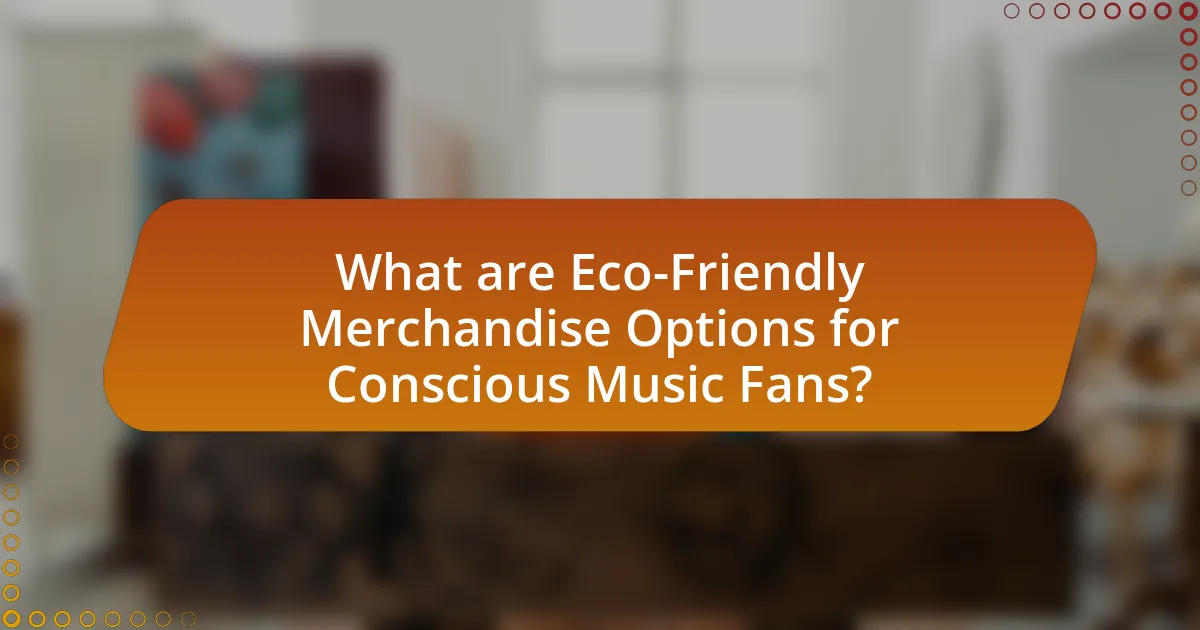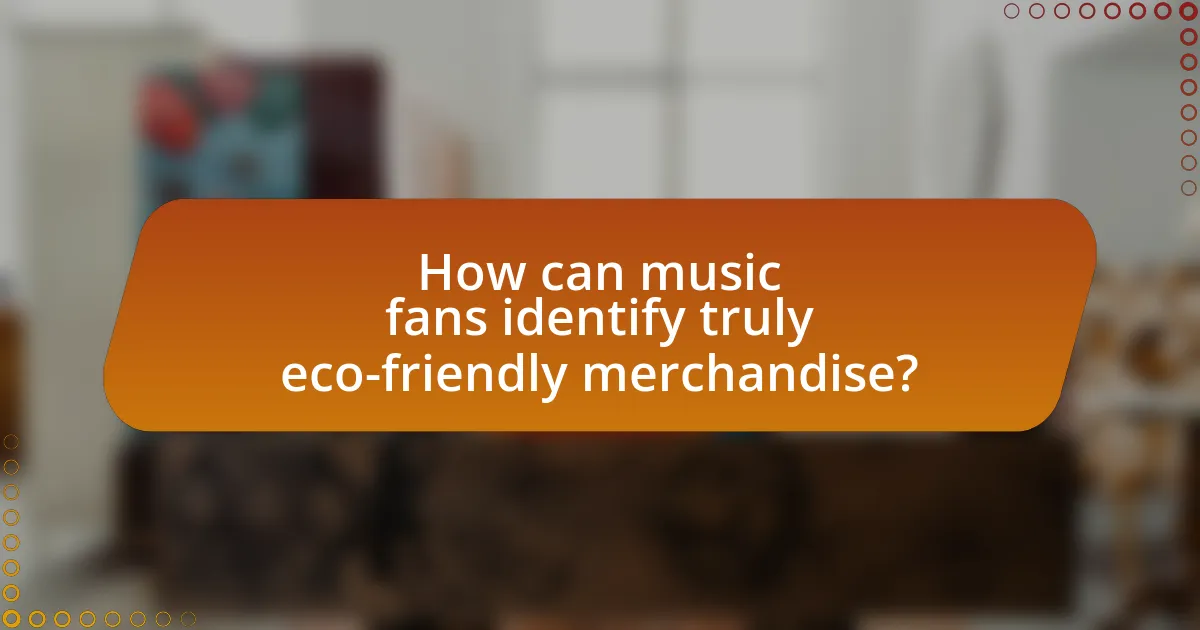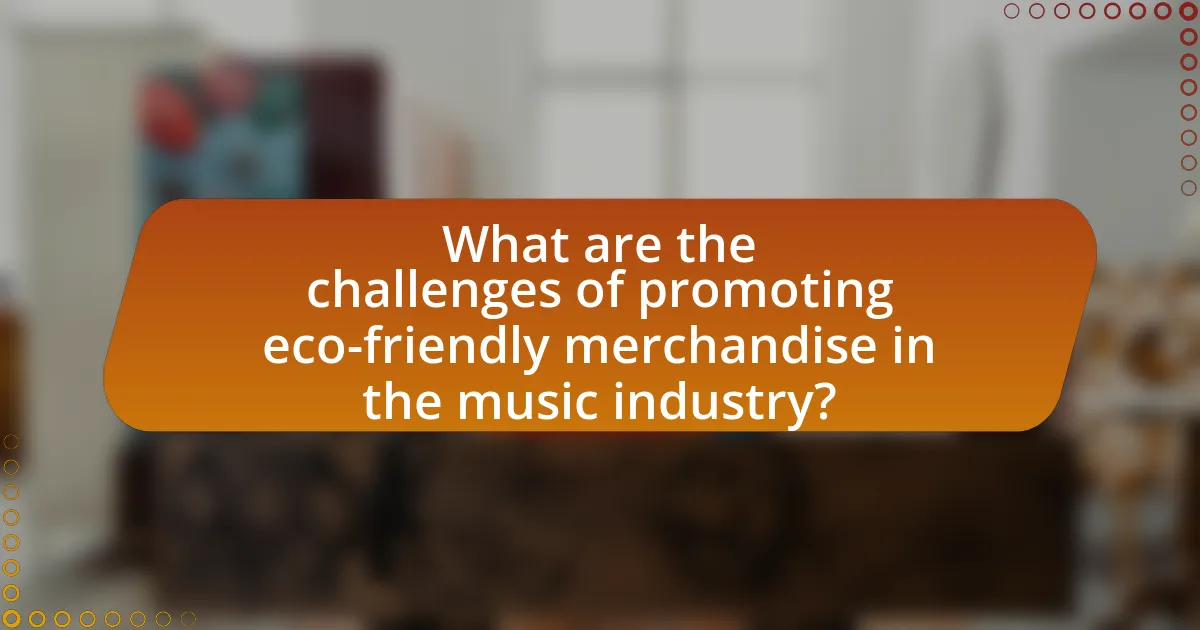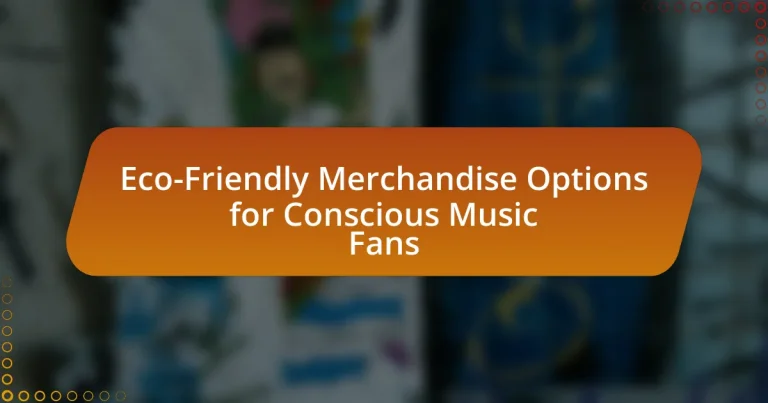Eco-friendly merchandise options for conscious music fans include sustainable products such as organic cotton apparel, recycled vinyl records, and biodegradable phone cases. These items help reduce environmental impact by utilizing renewable resources and minimizing waste. The article emphasizes the importance of eco-friendly merchandise in aligning consumer choices with sustainability, highlighting the role of music fans in promoting environmentally responsible practices within the industry. It also discusses the types of eco-friendly products available, how to identify them, and the certifications that ensure their sustainability, while addressing the challenges faced by artists and brands in adopting these practices.

What are Eco-Friendly Merchandise Options for Conscious Music Fans?
Eco-friendly merchandise options for conscious music fans include items made from sustainable materials, such as organic cotton t-shirts, recycled vinyl records, and biodegradable phone cases. These products reduce environmental impact by utilizing renewable resources and minimizing waste. For instance, organic cotton t-shirts are produced without harmful pesticides, while recycled vinyl records help divert plastic from landfills. Additionally, brands like Patagonia and Eco-Products offer eco-conscious merchandise that aligns with the values of environmentally aware consumers.
Why is eco-friendly merchandise important for music fans?
Eco-friendly merchandise is important for music fans because it aligns their purchasing choices with environmental sustainability, reducing the ecological footprint associated with music consumption. By choosing eco-friendly products, fans support practices that minimize waste, use sustainable materials, and promote ethical production methods. For instance, a study by the Ellen MacArthur Foundation highlights that the fashion industry, which includes merchandise, contributes to 10% of global carbon emissions; thus, opting for eco-friendly alternatives can significantly mitigate this impact. Additionally, many music fans are increasingly aware of climate change and prefer to support artists and brands that reflect their values, making eco-friendly merchandise a crucial aspect of their identity and community engagement.
How does eco-friendly merchandise impact the environment?
Eco-friendly merchandise positively impacts the environment by reducing waste and minimizing resource consumption. These products are typically made from sustainable materials, which lowers the carbon footprint associated with production. For instance, using organic cotton instead of conventional cotton can reduce water usage by up to 91% and eliminate harmful pesticides, as reported by the Organic Trade Association. Additionally, eco-friendly merchandise often promotes recycling and upcycling, further decreasing landfill contributions and encouraging a circular economy. This shift not only conserves natural resources but also fosters awareness about environmental issues among consumers.
What role do music fans play in promoting sustainability?
Music fans play a crucial role in promoting sustainability by supporting eco-friendly merchandise and advocating for environmentally responsible practices within the music industry. Their purchasing choices influence artists and brands to prioritize sustainable materials and production methods. For instance, a study by the University of California found that consumer demand for sustainable products can lead to a 30% increase in companies adopting eco-friendly practices. By choosing to buy items like organic cotton apparel or reusable products, music fans not only reduce waste but also signal to the industry that sustainability is a priority, thereby driving change and encouraging more artists to adopt green initiatives.
What types of eco-friendly merchandise are available?
Eco-friendly merchandise includes reusable bags, biodegradable phone cases, organic cotton apparel, recycled paper products, and sustainable drinkware. These products are designed to minimize environmental impact by using renewable resources and reducing waste. For example, organic cotton apparel is made without harmful pesticides, while biodegradable phone cases break down naturally, reducing plastic pollution.
What are the most popular eco-friendly products among music fans?
The most popular eco-friendly products among music fans include reusable water bottles, organic cotton apparel, and biodegradable phone cases. Reusable water bottles reduce plastic waste and are often made from stainless steel or BPA-free materials, appealing to environmentally conscious consumers. Organic cotton apparel, such as t-shirts and tote bags, is favored for its sustainable production methods that avoid harmful pesticides. Biodegradable phone cases, made from plant-based materials, attract music fans looking to minimize their environmental impact while protecting their devices. These products align with the growing trend of sustainability in the music industry, as artists and festivals increasingly promote eco-friendly practices.
How do these products differ from traditional merchandise?
Eco-friendly merchandise options differ from traditional merchandise primarily in their materials and production processes. Eco-friendly products are made from sustainable, biodegradable, or recycled materials, reducing environmental impact, while traditional merchandise often relies on non-renewable resources and synthetic materials that contribute to pollution and waste. For instance, a study by the Ellen MacArthur Foundation highlights that the fashion industry, which includes merchandise, is responsible for 10% of global carbon emissions, emphasizing the need for sustainable alternatives.

How can music fans identify truly eco-friendly merchandise?
Music fans can identify truly eco-friendly merchandise by looking for certifications such as Global Organic Textile Standard (GOTS) for textiles, Fair Trade certification for ethical production, and the Forest Stewardship Council (FSC) label for paper products. These certifications ensure that the products meet specific environmental and social standards. Additionally, fans should check for materials made from recycled or sustainable sources, such as organic cotton or bamboo, which have a lower environmental impact. Research indicates that products with these certifications significantly reduce carbon footprints and promote sustainable practices in manufacturing.
What certifications should fans look for in eco-friendly products?
Fans should look for certifications such as USDA Organic, Fair Trade, Energy Star, and Global Organic Textile Standard (GOTS) when selecting eco-friendly products. These certifications indicate that products meet specific environmental and social standards. For instance, USDA Organic ensures that agricultural products are grown without synthetic fertilizers or pesticides, while Fair Trade guarantees fair wages and working conditions for producers. Energy Star signifies energy efficiency, and GOTS certifies that textiles are made from organic fibers and adhere to strict environmental and social criteria throughout the production process.
How do certifications ensure sustainability?
Certifications ensure sustainability by establishing standardized criteria that products must meet to be labeled as environmentally friendly. These criteria often include guidelines for resource management, waste reduction, and ethical sourcing, which help consumers identify products that align with sustainable practices. For instance, certifications like Fair Trade and Organic require adherence to specific environmental and social standards, ensuring that products are produced with minimal ecological impact and fair labor practices. This structured approach not only promotes transparency but also encourages manufacturers to adopt sustainable methods, thereby contributing to overall environmental conservation.
What are some common misleading claims in merchandise marketing?
Common misleading claims in merchandise marketing include assertions of “100% organic” materials that may only contain a small percentage of organic content, and labels like “eco-friendly” that lack certification or specific criteria. Additionally, terms such as “biodegradable” can be misleading if the product requires specific conditions to decompose, which are not typically met in landfills. Research from the Federal Trade Commission indicates that vague claims can mislead consumers about the environmental benefits of products, emphasizing the need for transparency and accurate labeling in marketing practices.
How can fans support eco-friendly brands?
Fans can support eco-friendly brands by purchasing their products, promoting their values on social media, and participating in brand initiatives. By choosing to buy from eco-friendly brands, fans contribute to the demand for sustainable practices, which encourages more companies to adopt environmentally friendly methods. Research indicates that consumers are increasingly prioritizing sustainability, with 66% of global consumers willing to pay more for sustainable brands, according to a Nielsen report. This consumer behavior reinforces the importance of supporting eco-friendly brands, as it directly impacts their growth and influence in the market.
What are the benefits of purchasing from sustainable brands?
Purchasing from sustainable brands offers environmental benefits, such as reduced carbon footprints and less waste. Sustainable brands often utilize eco-friendly materials and ethical production practices, which contribute to the preservation of natural resources. For instance, a study by the Ellen MacArthur Foundation indicates that transitioning to a circular economy could reduce global greenhouse gas emissions by 39% by 2030. Additionally, supporting sustainable brands fosters social responsibility, as these companies typically prioritize fair labor practices and community engagement. This alignment with ethical values can enhance consumer satisfaction and loyalty, as consumers increasingly prefer brands that reflect their values.
How can fans engage with eco-friendly brands on social media?
Fans can engage with eco-friendly brands on social media by actively participating in discussions, sharing content, and promoting sustainable practices. By commenting on posts, sharing their own experiences with eco-friendly products, and using relevant hashtags, fans can amplify the brand’s message and foster a community focused on sustainability. Research indicates that user-generated content can increase brand engagement by up to 28%, highlighting the effectiveness of fan participation in promoting eco-friendly initiatives.

What are the challenges of promoting eco-friendly merchandise in the music industry?
Promoting eco-friendly merchandise in the music industry faces several challenges, including higher production costs, limited consumer awareness, and competition from conventional merchandise. Higher production costs arise because sustainable materials and ethical manufacturing processes often require more investment compared to traditional options. Limited consumer awareness is a significant barrier, as many fans may not prioritize eco-friendly choices or understand their importance, leading to lower demand. Additionally, competition from conventional merchandise, which is typically cheaper and more readily available, makes it difficult for eco-friendly products to gain market traction. These factors collectively hinder the successful promotion of eco-friendly merchandise within the music industry.
What barriers do artists face in adopting sustainable practices?
Artists face several barriers in adopting sustainable practices, primarily including financial constraints, lack of access to sustainable materials, and limited knowledge about eco-friendly options. Financially, many artists operate on tight budgets, making it challenging to invest in more expensive sustainable materials or processes. Additionally, access to sustainable materials can be restricted, especially for independent artists who may not have established supply chains. Furthermore, a lack of awareness or knowledge about sustainable practices and their benefits can hinder artists from making informed choices, as many may not be familiar with the available eco-friendly alternatives or how to implement them effectively.
How can artists overcome these challenges?
Artists can overcome challenges related to eco-friendly merchandise by adopting sustainable production practices and collaborating with environmentally responsible suppliers. By utilizing materials such as organic cotton, recycled plastics, and biodegradable packaging, artists can significantly reduce their environmental impact. Research indicates that the global organic cotton market is projected to grow, reflecting a rising consumer demand for sustainable products. Additionally, partnering with companies that prioritize sustainability can enhance an artist’s brand image and attract eco-conscious fans, ultimately leading to increased sales and loyalty.
What role do music festivals play in promoting eco-friendly merchandise?
Music festivals play a significant role in promoting eco-friendly merchandise by providing a platform for sustainable brands to reach a large audience. These events often feature vendors that specialize in environmentally friendly products, such as reusable water bottles, biodegradable utensils, and organic clothing. For instance, festivals like Coachella and Glastonbury have implemented initiatives to encourage the sale of eco-conscious items, highlighting their commitment to sustainability. This exposure not only raises awareness among attendees but also influences consumer behavior, as many festival-goers are increasingly seeking out eco-friendly options. Additionally, the integration of sustainability into festival branding reinforces the importance of environmental responsibility within the music community.
How can fans advocate for more sustainable practices in the music industry?
Fans can advocate for more sustainable practices in the music industry by actively supporting artists and brands that prioritize eco-friendly initiatives. This includes purchasing merchandise made from sustainable materials, such as organic cotton or recycled products, which reduces environmental impact. Additionally, fans can engage in social media campaigns to raise awareness about sustainability issues, encouraging artists to adopt greener practices in their tours and productions. Research indicates that 70% of consumers are willing to pay more for sustainable products, highlighting the market demand for eco-conscious merchandise. By voicing their preferences and holding the industry accountable, fans can drive significant change towards sustainability in music.
What actions can fans take to influence artists and brands?
Fans can influence artists and brands by actively engaging in social media campaigns that promote eco-friendly merchandise. By sharing their preferences and supporting sustainable practices through likes, shares, and comments, fans can create a demand for environmentally conscious products. For instance, a study by Nielsen indicates that 66% of consumers are willing to pay more for sustainable brands, demonstrating that fan advocacy can lead to significant changes in brand strategies. Additionally, fans can participate in petitions or surveys that express their desire for eco-friendly options, further signaling to artists and brands the importance of sustainability in their merchandise offerings.
How can fans collaborate with organizations focused on sustainability?
Fans can collaborate with organizations focused on sustainability by participating in initiatives such as community clean-up events, fundraising for eco-friendly projects, and promoting sustainable practices through social media campaigns. These collaborative efforts can amplify the impact of sustainability initiatives, as fans often have significant influence within their communities. For example, research indicates that grassroots movements led by fans can increase awareness and participation in sustainability efforts, leading to measurable environmental benefits.
What are some practical tips for conscious music fans when purchasing merchandise?
Conscious music fans should prioritize purchasing merchandise that is sustainably produced and ethically sourced. This includes seeking out items made from organic materials, such as organic cotton or recycled fabrics, which reduce environmental impact. Additionally, fans should research the brands they support, ensuring they have transparent supply chains and fair labor practices. According to a 2021 report by the Fashion Transparency Index, only 40% of brands disclose their supply chain information, highlighting the importance of consumer awareness. Lastly, fans can consider buying directly from artists at concerts or through their official websites, which often ensures that a larger portion of the proceeds goes directly to the musicians, supporting their work while promoting sustainable practices.


